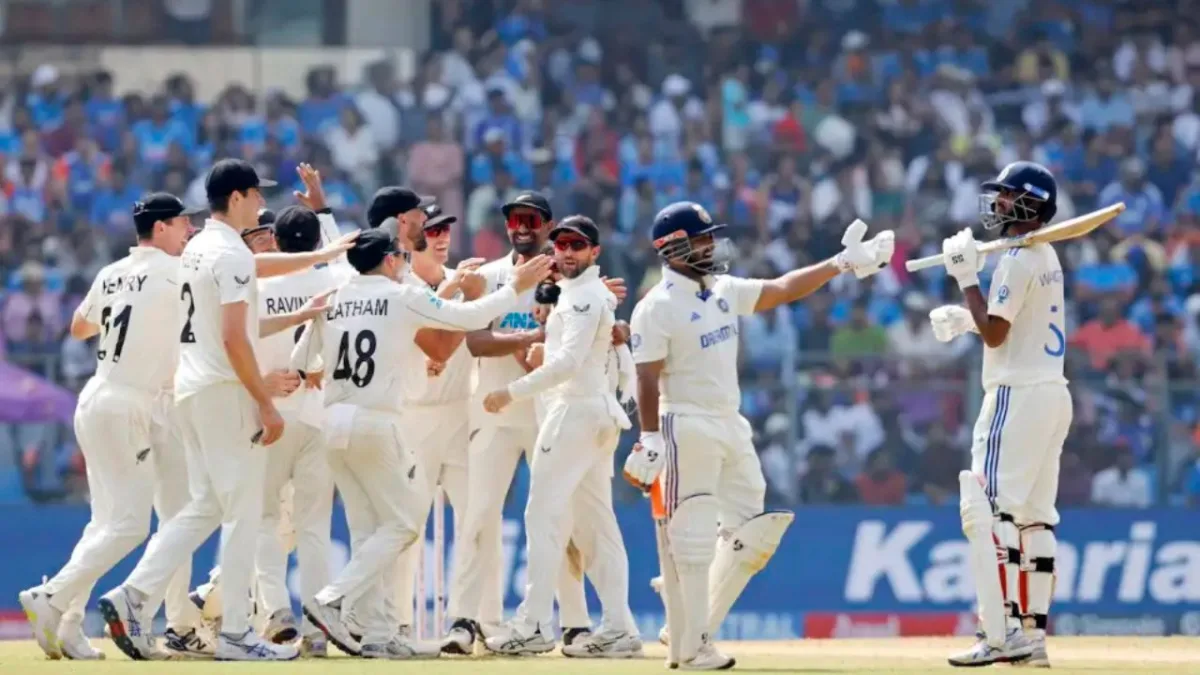Rishabh Pant stood between New Zealand and history, as they aimed to become the first team to whitewash India in a three-match series on Indian soil. Pant was India’s last stand, holding the answer to whether New Zealand could achieve this feat. In this 11 vs. 1 battle, New Zealand ultimately emerged victorious. This marks only the second time in history that India has been whitewashed at home. The first was in 2000 when South Africa defeated India on their home soil in a two-match series. However, this is the first time India has faced a whitewash in a series of three or more matches. The Kiwis achieved this historic feat under the captaincy of Tom Latham.
India was already on the back foot before the start of the Wankhede Test, having lost the first two matches in Bengaluru and Pune. On the third day of the match, Team India got a target of 147 runs to win this test. However, while chasing this relatively low target, Indian batters are struggling like the previous two matches. The team lost their first wicket, that of captain Rohit Sharma, at just 13 runs, and from there, the wickets kept tumbling. India lost 5 wickets for just 29 runs. Besides Rohit, star batter Virat Kohli (1), Sarfaraz Khan (1), Shubman Gill (1), and Yashasvi Jaiswal (5) all failed to score big runs in this high-pressure situation. The entire Indian middle order got trapped by Kiwi bowler Ajaz Patel’s masterful spin, as his clever deliveries dismantled the lineup.
#TeamIndia came close to the target but it’s New Zealand who win the Third Test by 25 runs.
Scorecard – https://t.co/KNIvTEyxU7#INDvNZ | @IDFCFIRSTBank pic.twitter.com/4BoVWm5HQP
— BCCI (@BCCI) November 3, 2024
While chasing the target, Team India was bowled out for just 121 runs. Rishabh Pant was the standout performer, scoring the highest for India with 64 runs, featuring nine fours and one six. Regrettably, following the Bangalore Test, in Wankhede, a total of eight batters in the team failed to score double figures.
Notably, after winning the first two Tests, New Zealand faced India in the third Test at Wankhede. Winning the toss, New Zealand elected to bat first and posted a total of 235 runs, getting all out. In response, Team India managed to score 263 runs in their first innings. However, in their second innings, New Zealand struggled, being bowled out for just 174 runs, setting a target of 147 runs for Team India. At this point, it seemed that Team India had a good chance of victory, but unfortunately, they faltered and were all out for just 121 runs, resulting in a disappointing loss.
So, before the start of the Australian tour, the Indian team faces a critical question: if they are unable to perform on their home soil, how can they expect to perform well in the challenging conditions of Australia? In addition to this, after being whitewashed by New Zealand, India has slipped to the second position in the World Test Championship (WTC) standings. Meanwhile, New Zealand’s victory over South India propelled them into fourth place in the table. If Team India wishes to play the WTC final, they must achieve a series victory on Australian soil.

